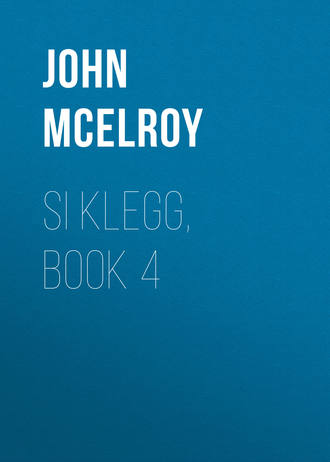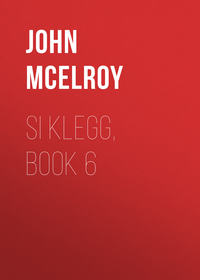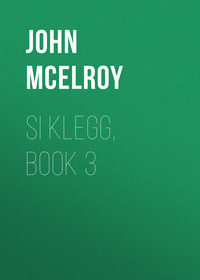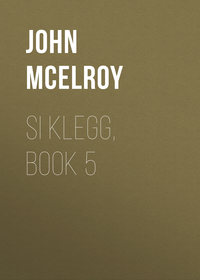 полная версия
полная версияSi Klegg, Book 4
"But fwhere is the powdher to make the ball go?" persisted Barney, looking at the cartridge which Shorty had put in his hand.
"The powder is behind the ball in that paper bag," explained Shorty. "You tear the paper with your teeth this way, and pour the powder into the muzzle."
"Fhat," said Barney contemptuously, surveying the cartridge. "There isn't enough powdher there to throw a ball as far as Oi can a pebble. Fwhy, Oi used to put a whole handful o' powdher in the old blunderbuss. Oi wud do betther to whack a man wid a shillelah. And fwhere is the flint to stroike foire?"
"O, the flintlock's played out, you flannel-mouthed Irishman," said Shorty irritably. "It's as out-of-date as a bow and arrer. This's a percussion-lock; don't you understand? This is a cap. You stick it right on this nipple, an' when the hammer goes down off goes your gun. Don't you see?"
"Well, you can say, maybe, an' maybe you can't But Oi can't. Take your old goon. Oi'll none avit.
"May the divil fly away wid it, an' wid you, too. Oi'd rather have a good shtick. Wid a shtick in me fist Oi'll take care of ony spalpeen fwhat'll stand up in front av me. But wid a fool goon loike that Oi'd be kilt at wance."
While Si and Shorty were still worrying about what to do for arms for the remainder of their men, they heard what seemed to be about a company marching toward them through the darkness.
"I suppose we had better stop here and stack our arms out of the way," they heard the officer say who seemed to be in command. "We've got an all-night's job before us, fixing up that bridge, and getting those wagons across. Stack arms, boys, and leave your belts and traps with them. There's lots of work down there for us."
They could see dimly the men obeying the orders, and going down the bank of the creek, where they started large fires to light them at their work.
"They have got a job ahead of 'em," remarked Shorty, looking in the direction of the fires.
"It'll take 'em all night and a large part o' tomorrow," said Si, significantly, as a thought entered his mind.
"Indeed it will," accorded Shorty, as the same idea occurred to him. "An' they won't need their guns. They're only pioneers, anyway."
"If they do," chimed in Si, "they kin pick up plenty more just as good around somewhere, when daylight comes. That's what pioneers is for."
"Si, you ketch on like a he snappin' turtle," said Shorty joyfully. "We'll jest help ourselves to them guns and cartridge-boxes, and then move our camp over a little ways, and skeet out airly in the mornin' for the front, and we'll be all right. Don't say nothin' to the Lieutenant about it. He'll be all right, and approve of it, but he mustn't know anything of it officially. You git the men up and I'll go over and give the Lieutenant the wink and tell him that we've found a much better bivouac about a mile further on."
While the pioneers were struggling with their task, and the air down by the creek was filled with shouts and commands, Si and Shorty, with some of the others, quietly appropriated enough stands of arms to complete the equipment of their squad.
Shorty took much credit for his honesty and forbearance that he did not touch a single one of the pioneers' belongings but their arms. A little later the squad was in bivouac a mile away.
At the earliest dawn of Sept. 20 they were awake, and after a hasty breakfast moving out the Rossville road for the battlefield. Only an occasional shot from a nervous picket, peering into the deep fog, or angry spatter from a squad of scouting cavalry disturbed the stillness of the beautiful Autumn morning. The bright rays of the level sun were bringing out the rich tints of the maples and dog woods on the mountain-sides in all their gorgeous richness. Nature was smiling so benignantly on every side that it needed the turmoil and rush in the winding roads to remind one that somewhere near men were in bitter contrast with her divine serenity. But the roads were crowded with ammunition and ration wagons pushing out to the front, and with mounted officers and Orderlies making their way as rapidly as possible back and for ward with orders and messages.
Lieut. Bowersox left the road with his detachment and made his way across the fields, over ditches, ravines and creeks, through the thickets and the brush, and at last came out on top of Missionary Ridge at the north side of Rossville Gap.
With eager eyes they scanned the landscape of billowy mountains and hills to the east and south.
A fog obscured all the lowlands, but far out columns of thin smoke rising lazily on the still air showed where 150,000 men were marshaling for bloody conflict.
"That Major I spoke to," said Lieut. Bowersox, as Si and Shorty looked anxiously in his face, "is on the corps staff, and he says the whole infernal Southern Confederacy is out there for blood. They jumped us yesterday like a pack of famished wolves. But Rosecrans had just got his army together in time, though some of the divisions had to march till their tongues were hanging out. All the boys were dead game, though, and they stood the rebels off everywhere in great shape. He hasn't the faintest idea where the 200th Ind. is. The divisions and brigades have been jumped around from one end of the line to the other till he has but little more idea where any regiment is than if it was in the moon. The only way for us is to make our way as fast as we can to the front, where they need every man, and trust to luck to find the regiment. We'll probably not find it, but we'll find a place where they need us badly."
"Le's go ahead, then," said Si firmly, "as fast as we can. We'd much rather be with the regiment, but we'll take whatever comes wherever it comes, and do our level best."
"I know you will, Sergeant," answered the Lieutenant. "Take another look over your men. See that they've all cartridges, and caution them to keep cool, stay together, whatever happens, and listen to orders."
Si felt a new and keener solicitude than he had ever before experienced. Hitherto his only thoughts were as to his own safety and to do himself credit in the discharge of his duty. Now he felt a heavy responsibility for every man in the detachment.
He walked slowly down the front of the line, and looked into every man's face. They appeared anxious but resolute. The face of Wat Burnham, the Englishman, had settled into more of a bull-dog look than ever. The Irishmen seemed eager. Abel Waite, the boy on the left, was as excited as if a game of foot-ball was to come off. He called out:
"Say, Sergeant, I hain't got but 10 cartridges. Will that be enough?"
"It'll have to be enough for the present," answered Si. "Be careful of 'em. Don't waste none. Be sure o' your man, aim low, git under his belt, an' be careful to ketch your hind-sight before you pull the trigger. If we need more cartridges we'll have to find more somewhere."
From away beyond the green and yellow waves of hills came the crash of the reopened battle. The ripping noise of regiments firing by volley was hoarsely punctuated by the deep boom of the field-pieces.
"Attention, company! Forward March!" shout ed Lieut. Bowersox.
They swept down the mountain-side, over the next eminence, and so onward. At every crest that they raised the uproar of the battle became louder, the crash of musketry and the thunder of the can non more continuous. The roads were so filled with teams being urged forward or backward that they could not follow them, but had to make their way through the woods and occasional fields, only keeping such direction as would bring them quickest to some part of the stormy firing-line.
The Lieutenant and Si and Shorty tried to make themselves believe that the noise was receding, showing that the rebels were being driven. At times it certainly was so, and then again it would burst out,
"Nearer, clearer, deadlier than before," and their hearts would sink again. A little past noon they came upon a hight, and there met a sight which, for the moment, froze their blood. To their right front the whole country was filled with men flying in the wildest confusion. All semblance of regimental order was lost in the awful turmoil. Cannon, sometimes drawn by two or three horses, sometimes by only one, were plunging around amid the mob of infantrymen. Mounted officers were wildly galloping in all directions. Colors were carried to crests and ridges, and for a moment groups of men would gather around them, only to melt again into the mob of fugitives. From far behind came the yells of the exultant rebels, and a storm of shot and shell into the disorganized mass.
The boys' hearts sickened with the thought that the whole army was in utter rout. For a minute or two they surveyed the appalling sight in speech less despair. Then a gleam of hope shot into Si's mind.
"Listen," he said; "the firing is heavier than ever over there toward the center and left, and you can see that men are goin' up instid o' runnin' away. It's Stone River over again. McCook's bin knocked to pieces, just as he always is, but old Pap Thomas is standing there like a lion, just as he did at Stone River, and he's holding Crittenden with him."
"You're right, Si," shouted the Lieutenant and Shorty. "Hip, hip, hooray for the Army o' the Cumberland and old Pap Thomas!"
They deflected to the left, so as to avoid being tangled up in the mass of fugitives, and pushed forward more determinedly, if possible, than ever. They kept edging to the right, for they wanted to reach Thomas's right as nearly as possible, as that was the natural position of their regiment.
Presently, on mounting a roll of the ground, they saw sloping down from them a few rods away, and running obliquely to their right, a small "deadening," made by the shiftless farmer for his scanty corn crop. A mob of fugitives flying through had trampled the stalks to the ground. Si and Shorty had seen some of them and yelled at them to come up and form on them, but the skedaddlers either would not or could not hear.
Beyond the "deadening" came a horde of pursuing rebels, firing and yelling like demons. The sight and sound swelled the boys' hearts with the rage of battle.
"Lieutenant," suggested Si, "there's no need o' goin' any further just now for a fight. We can have just as nice a one right here as we can find anywhere. I move that we line up back here and wait for them rebels to come on, an' then git 'em on the flank with an enfilade that'll salivate 'em in a holy minute."
"The same idea has occurred to me," said the Lieutenant; "though I've felt all along that we should not be diverted by anything from making our way as fast as possible up to the main line. What do you think, Shorty?"
"My idee is to down a rebel whenever you git a good chance," said Shorty. "'Do the work nearest thy hand,' I once heard an old preacher say. Le's jump these hounds right here."
"All right," assented the Lieutenant quite willingly. "Form the men just back of the edge of the woods. Keep them out of sight, and caution them not to shoot till they get the order. We must wait till we get the rebels just right."
Si and Shorty hurriedly posted the men behind trees and rocks, cautioned them to wait for orders, and fire low, and then stationed themselves, one at the right, and the other at the left of the irregular line. They had scarcely done so when the rebels came surging through the "deadening" in a torrent. They were urged on by two mounted officers wear ing respectively the silver stars of a Colonel and a Major.
"The feller on the bay hoss's my meat," shouted Shorty from the left.
"All right," answered Si. "I'll take the chap on the roan."
"Wait a little," cautioned the Lieutenant. "We'll get more of them if you do. Now, let them have it. Ready Aim FIRE!"
Down went the Colonel and Major and fully 50 of their men. The Indiana recruits might be green as to tactics, but they knew how to level a gun.
The startled rebels ceased yelling, and looked around in amazement in the direction whence the unexpected fire came. A few began firing that way, but the majority started to run back across the "deadening" to the sheltering woods. Groups gathered around the fallen officers to carry them back.
"Load as fast as you can, boys," commanded the Lieutenant. "That was a good one. Give them an other."
The young Irishmen were wild with excitement, and wanted to rush down and club the rebels, but the Lieutenant restrained them, though he could not get them to reload their guns. As Si was bringing down his gun he noticed the Englishman aiming at the groups about the officers.
"Don't shoot them. Fire at the others," Si called out, while he himself aimed at a man who was try ing to rally his comrades.
"W'y the bloody 'ell shouldn't Hi shoot them the same has the hothers?" snarled the Englishman, firing into the group. "They're all bloody rebels."
By the time the second round was fired the "deadening" was clear of all the rebels but those who had been struck. The others were re-forming on the knoll beyond, and a field-piece was hurried up to their assistance, which threw a shell over at the line.
"We had better move off," said the Lieutenant. "They're forming out there to take us in flank, and we can't hold them back. We have done all that we can here, and a mighty good job, too. We have saved a lot of our men and salted a good bagful of rebels. Attention! File left March!"
"That was a mighty good introduction for the boys," said Si to Shorty as they moved on through the woods. "They begin to see how the thing's done; and didn't they act splendidly? I'm proud of Injianny."
"Sergeant, didn't I do well?" asked Abel Waite, in the tone that he would have inquired of his teacher about a recitation. "I done just as you told me. I kep' my eye on the tall feller in front, who was wavin' his gun and yellin' at the rest to come on. I aimed just below his belt, an' he went down just like I've seen a beef when pap shot him."
"Good boy," said Si, patting him on the shoul der. "You're a soldier already."
CHAPTER XVI. THE TERRIFIC STRUGGLE
THE END OF THE BATTLE OF CHICKAMAUGALIEUT. Bowersox, Si, Shorty and the recruits left the woods and entered a large clearing, in the midst of which was a log cabin, with a few rude outbuildings. Over it flew the yellow flag of the hospital service, and beyond could be seen the parked trains and other evidences of the line-of-battle.
The roar of the battle would have told them as much, for it was now deafening. The earth seemed to throb and the trees shake with the awful shocks. As they passed the hospital they saw a grewsome pile of amputated legs and arms, while the ground around about was filled with wounded, whose groans pierced through the roar of battle.
James Bradshaw and Simeon Wheelwright, the two tall, stalwart men who had stood on the right and who had shown great coolness during the fight, gave one look at the dismembered limbs, turned pale as death, gasped, and fell in a faint.
"Forward! Can't stop to pay attention to them," commanded the Lieutenant, in whom the battle-fever was burning.
Though still more than two miles from the low crest of Snodgrass Hill, where Gen. Thomas, with the remainder of the Army of the Cumberland, was standing savagely at bay against the fierce assaults of Bragg's and Longstreet's overwhelming numbers, they were soon in the midst of the wild ruck and confusion of the rear of a great battle. Miles of wagons were being urged hither and yon, some times in accordance with intelligent orders by officers, more often from the panicky fears of wagon-masters and teamsters; riderless horses with saddles under their bellies were galloping frantically around; squads of artillerymen in search of ammunition were storming about, cursing cowardly teamsters, whom they could not find; streams of wounded men were trying to make their way to the hospitals; officers were yelling and swearing in their attempts to rally shirks and cowards who had fled from the front; men from regiments which had been broken and scattered by the fierce assaults were trying to find their colors; Colonels whose regiments had been ordered up from the rear were fiercely forcing their way forward, with many dire objurgations on all who impeded their progress.
It was a scene to discourage any but the stoutest heart, yet it only wrought up the boys to greater eagerness to get through to the firing-line.
The smoke-crowned crest of Snodgrass Hill was seen but half a mile away. They could make out the ragged, irregular line of blue constantly vailing itself in sulphurous vapor as it poured murderous volleys into the enemy. The shrill yell of the rebels as they renewed the charge, and the deep-toned cheer of the Union soldiers as they repulsed it, reached their ears in the momentary lulls of the firing.
So far, in spite of all deterrents, they had brought every man through except the two who had fainted at the hospital. Everyone had shown true metal. Little Abel Waite had particularly distinguished him self by skillful dodging under wagons and past flanks, in order to keep up with the swift pace of the longer-legged men.
They had as yet found no one in all the throng to give them the least information as to their regiment, when Si spied a member of Co. Q walking deliberately back, holding the wrist of his shattered left hand in his right, with his fingers compressing the artery to restrain the flow of blood.
"There's Silas Peckham," exclaimed Si, running up to him. "Badly hurt, Sile?"
"No," answered Silas, more coolly than if he had stubbed his toe. "Left hand's gone on a strike. That's all. Wisht I could find a doctor to fix it up so I could git back to the boys. They're havin' an awful tussle up there, an' need me bad. Better hurry up, Si. Don't waste no time on me. I'll find a doctor soon an' be back with you."
"Where's the regiment, Sile?" asked the Lieutenant.
"Right up there to the left o' them tall hickories," answered Silas, pointing with his bloody hand. "To the right o' that battery, you see there. That's our bully old battery at work. Greatest battery in the army. I've kept my eye on the place, because I want to git back as soon's I kin find the Surgeon. Ain't much left o' the regiment, or battery either, for that matter; but they're raisin' hell with the Johnnies every time, and don't you forgit it. Capt. McGillicuddy's in command."
"Capt. McGillicuddy?" said the Lieutenant. "Why, he's the junior Captain in the regiment."
"He was yisterday mornin', but he's now senior to everybody that's alive," answered Silas. "The Kunnel wuz killed yisterday forenoon. The Lootenant-Kunnell held out about three hours an' then he got it for keeps, an' the Major tuck command an' stuck out till nigh evenin', when they knocked him.
"This mornin' the Captains 's bin going down so fast that I couldn't keep track of 'em, till Capt. McGillicuddy was the only one left, an' he's swearin' that the rebels never run no bullet that could hit him. The Adjutant's acting Lootenant-Kunnel an' Major both to-wunst, and shootin' a gun when he hain't nothin' else to do. But the boys that's left 's stayers, I tell you. They've jest stuck their toenails into that hilltop there, an' every time them howlin' rebels come yippin' an' ki-yi-in' out o' the woods they send 'em back on the dead run. But they want you up there bad. You've got more than's left in the regiment. Hurry up. I'll be back with you jest as soon's I kin find a doctor to cooper me up a little."
"Forward Quick time March!" shouted the Lieutenant. "Guide on those tall hickories."
Onward they rushed full into the smoke that drifted backward down the hill. As they gained the crest the air became clearer, and they saw the sadly-shrunken remnant of their regiment strung in an irregular line along the forward edge. Some were binding up wounds more or less severe, some were searching the boxes of the dead and wounded for cartridges, some were leaning on their hot guns, looking curiously into the woods at the foot of the slope into which the rebels had fled.
Every face was blackened with powder almost beyond recognition. The artillerymen to the left were feverishly swabbing out their guns and trying to cool them off, and bringing up everything in the shape of ammunition from the limbers in the rear.
Capt. McGillicuddy was leaning on his sword at the right of the line, intently watching everything. He looked sharply around, when the men raised a cheer on recognizing Si and the rest, and coming back shook Lieut. Bowersox warmly by the hand, saying:
"Great God, Lieutenant, I've always been glad to see you, but I never was so glad to see a man in my life as I am you this minute. How many men did you bring?"
"I've got 128 with me," answered the Lieutenant. "What's the situation?"
"You have? Well, you've got more than we have left. You'll act as Major. Poor Wilkinson just got his dose. You can see him lying down there in the rear of the left. Put your men in anywhere. Mix them up with the others.. It don't matter much about formation. The main thing's to stand and shoot. The rebels have been charging us all after noon, but we have whipped them back every time.
"You can see our work out there (pointing to the slope in front, which was literally covered with dead and wounded). I've thought every time that they couldn't stand another such a slaughter, but they've rallied in those woods there and come out again with their infernal yell, just as before. The last time it seemed to me that we just swept them off the face of the earth, and I don't see how in God's name they can stand any more of that sort of thing. It's worse killing than we gave them at Stone River. It seems to me that hell has let out for noon, and sent all its devils to reinforce them. But it will soon be night now, when they'll have to stop. If they won't we'll have to depend on the bayonet, for we haven't five rounds apiece left, and I can't get more anywhere."
Si and Shorty had been distributing the detachment along the line, and had posted the Englishman and his squad of Irishmen, with themselves, around the tattered colors, which were now in the hands of the last survivor of the color guard, who was himself wounded.
Dusk was fast coming on, when the woods beyond the foot of the slope began to darken again with masses of men arraying in column of assault.
"They're coming again," called out Capt. McGillicuddy. "Lieut. Bowersox, look out there for the left. Men, if we haven't stopped them when we've fired out last shot, we'll fix bayonets and charge them. We must keep them off this hill or die right here."
He was answered with cheers. A demoniac yell from 10,000 fierce throats rang through the woods, and the next instant thunder and flames burst from the sweeping crescent of rebel cannon, and the ground in front of the foot of the hill was hidden from view by the tide of men rushing over it.
A fierce storm of cannon and musketry answered from the crest of the hill. As they reloaded, Si and Shorty saw in quick glances that the rebel line to the right and left seemed beaten to a standstill by the terrific storm which fell upon them, but in their immediate front a body of men, apparently a regiment, kept stubbornly forging forward. Upon their flag, held gallantly aloft, could be made out the let ters "Miss."
By the time every shot in the cartridge-boxes had been fired at them they had forced their way half-up the slope.
"Attention, 200th Indiana," shouted Capt. McGillicuddy. "Dress on the colors. Fix bayonets."
"They'uns 's Injiannians," shouted the rebel Color-Sergeant, waving his flag defiantly. "Come on, you Hoosiers. We'uns 's Mississippians. Remember Buny Visty. Injiannians 's cowards."
"Shorty, le's have that 'ere flag," said Si.
"Le's," said Shorty, pushing around the ring that locked his bayonet on.
"Forward March Charge!" shouted Capt. McGillicuddy.
Of the mad whirl of an eternity of events in the next few minutes neither Si nor Shorty had anything but a delirious remembrance. They could only recollect the fierce rush of the lightning-like play of bayonet and gun-barrel in the storm-center around the rebel colors. Each after an instant's savage fencing had sent his bayonet home in his opponent's body. Si had sprung at and seized the rebel colors, only to fall, as he grasped them, from a bullet out of the revolver of a rebel Captain, whom Shorty instantly bayoneted, and fell himself from a blow across the head with a musket-barrel.









